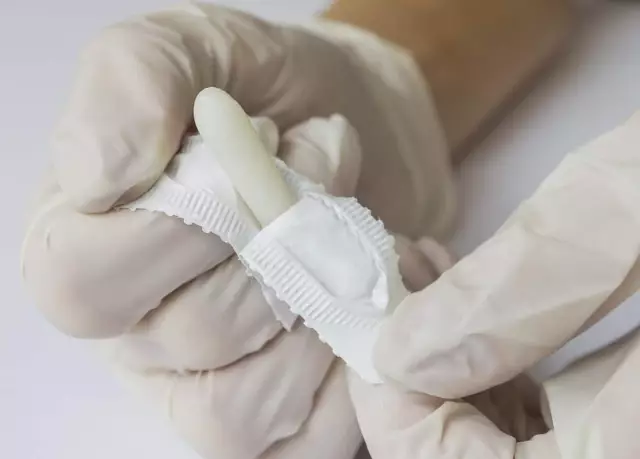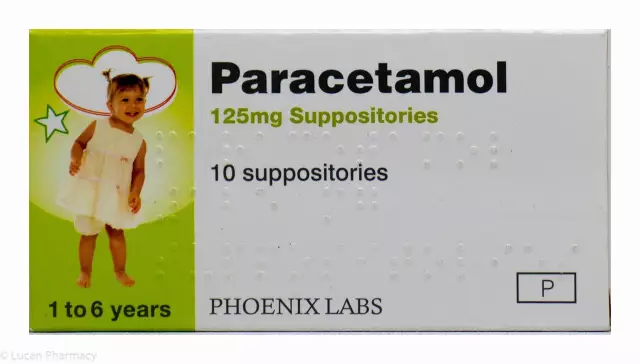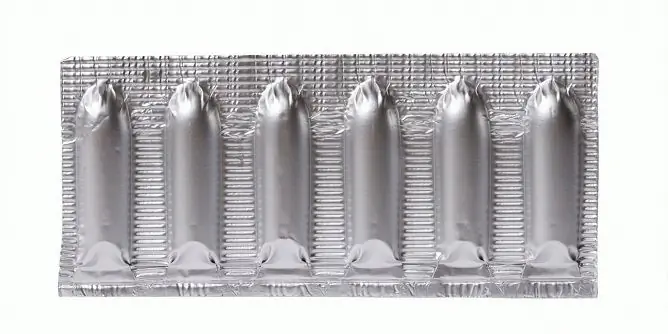- Author Rachel Wainwright wainwright@abchealthonline.com.
- Public 2023-12-15 07:39.
- Last modified 2025-11-02 20:14.
Torekan
Torekan: instructions for use and reviews
- 1. Release form and composition
- 2. Pharmacological properties
- 3. Indications for use
- 4. Contraindications
- 5. Method of application and dosage
- 6. Side effects
- 7. Overdose
- 8. Special instructions
- 9. Application during pregnancy and lactation
- 10. Use in childhood
- 11. In case of impaired renal function
- 12. For violations of liver function
- 13. Use in the elderly
- 14. Drug interactions
- 15. Analogs
- 16. Terms and conditions of storage
- 17. Terms of dispensing from pharmacies
- 18. Reviews
- 19. Price in pharmacies
Latin name: Torecan
ATX code: R06AD03
Active ingredient: thiethylperazine (Thiethylperazine)
Producer: KRKA, dd, JSC Novo Mesto (KRKA, dd, Novo Mesto) (Slovenia)
Description and photo update: 2020-20-02

Torecan is an antiemetic that blocks histamine H1 receptors.
Release form and composition
- film-coated tablets: biconvex, round, almost white or white in a shell, possibly with a specific odor (50 pcs. in a dark glass bottle with a polyethylene lid, 1 bottle in a cardboard box);
- solution for intravenous (i / v) and intramuscular (i / m) administration: colorless or slightly pale yellow transparent liquid (1 ml each in a neutral glass ampoule with a colored dot and a colored coding ring; in a blister 5 ampoules, in cardboard box 1 blister);
- rectal suppositories: cone-shaped, white or slightly yellowish-white [6 pcs. in a contoured cell-free package (strip), in a cardboard box 1 package].
Each pack also contains instructions for the use of Torekan.
1 tablet contains:
- active substance: thiethylperazine dimaleate - 10.3 mg (equivalent to thiethylperazine in the amount of 6.5 mg);
- additional components: stearic acid, lactose monohydrate, gelatin, corn starch, talc;
- shell: acacia gum, titanium dioxide, sucrose, talc, capol 600 (shellac, carnauba wax, white beeswax).
1 ml of solution contains:
- active substance: thiethylperazine dimalate - 10.86 mg (equivalent to thiethylperazine in the amount of 6.5 mg);
- additional components: sodium disulfite (sodium metabisulfite), sorbitol, ascorbic acid, water for injection.
1 suppository contains:
- active substance: thiethylperazine dimaleate - 10.3 mg (corresponds to thiethylperazine in the amount of 6.5 mg);
- additional components: solid fat, lactose monohydrate.
Pharmacological properties
Pharmacodynamics
Thietylperazine is a centrally acting antiemetic (piperazine derivative of phenothiazine). The active substance suppresses histamine H1 receptors and dopamine receptors in the nigrostriatal tract, almost without exerting an antipsychotic effect on a person. But despite the fact that the psychotropic effect of the drug used in low doses is minimal in comparison with its antiemetic effect, the drug can cause some negative reactions.
Torecan exhibits α-adrenergic blocking and M-anticholinergic blocking activity. Affects the chemoreceptor trigger (trigger) zone, located at the bottom of the IV ventricle of the brain, and the vomiting center, located in the medulla oblongata. The blockade of these structures provides an interruption of efferent signals that stimulate effectors involved in the act of vomiting. The active substance eliminates dizziness by affecting the coordination centers of the reticular formation. As a rule, the therapeutic effect is observed after the first use of the drug.
Pharmacokinetics
Thietylperazine is characterized by high absorption, its maximum concentration (C max) is observed 2-4 hours after application.
The drug is lipophilic and forms a strong bond with blood plasma proteins (more than 85%). Easily passes through the placenta, accumulates in organs with good blood flow. The volume of distribution (Vd) is 2.7 l / kg, the active ingredient is not excreted by dialysis.
The metabolic transformation process takes place mainly in the liver. The half-life (T 1/2) is on average 12 hours. Only 3% of the active substance is excreted by the kidneys unchanged.
Indications for use
All forms of release of Torekan are recommended for the treatment (solution, including for prevention) of nausea and vomiting under the following conditions:
- postoperative period;
- the period after chemotherapy and radiation therapy;
- drug intolerance.
Additionally, for the treatment of nausea and vomiting, Torecan solution and tablets are prescribed for the following diseases:
- sea and air sickness;
- traumatic brain injury;
- lesions of the gastrointestinal tract (GIT), bile ducts and liver;
- dizziness of the central and vestibular origin (atherosclerosis, concussion, Meniere's disease, vestibular and labyrinthine disorders).
Contraindications
Absolute contraindications for the use of all forms of Torekan release:
- severe depression of the central nervous system (CNS) and / or disorders of consciousness;
- blood diseases;
- clinically significant arterial hypotension;
- hepatic and / or renal failure;
- Reye's syndrome;
- acute attack of angle-closure glaucoma;
- prolactinoma;
- Parkinson's disease and parkinsonism;
- hyperplasia of the prostate;
- pregnancy and lactation;
- combined use with bromocriptine;
- additionally only for tablets: glucose-galactose malabsorption syndrome, lactose intolerance, sucrase / isomaltase deficiency (since they contain lactose);
- additionally only for tablets and solution: bronchial asthma, children and adolescents up to 15 years old;
- additionally only suppositories: diseases of the cardiovascular system, depression, coma, children and adolescence up to 18 years;
- hypersensitivity to any of the constituents of the drug.
Torecan rectal suppositories should be used with caution in the presence of bronchial asthma or a history of dyskinesia.
Torekan, instructions for use: method and dosage
Torecan tablets are taken orally with a small amount of liquid.
Rectal suppositories are used by administration into the rectum.
Recommended dosing regimen: 6.5 mg of thiethylperazine (1 tablet or 1 suppository) 1-3 times a day.
The solution for intravenous and intramuscular administration is in most cases administered intramuscularly, the recommended daily dose is 6.5-13 mg (1-2 ampoules). To prevent postoperative vomiting, Torekan at a dose of 6.5 mg (1 ampoule) is injected intramuscularly 30 minutes before the completion of the operation.
Intravenous use of Torekan is allowed in exceptional cases, while the solution must be injected very slowly due to the threat of arterial hypotension. With intravenous and intramuscular injections of the drug, the patient should take a horizontal position, and then, for 1 hour after the injection, be under close medical supervision. Intra-arterial injection of the solution is prohibited.
The course of Torekan therapy depends on the course of the disease. As a rule, all forms of the drug are prescribed for 1 day. However, if necessary, the use of drugs can be extended up to several days / weeks.
In persons with impaired renal and / or liver function, the dosage regimen of Torekan is not precisely established, however, a dose reduction is recommended for patients from this group (1 tablet / suppository per day).
Side effects
- nervous system: infrequently - drowsiness, headache, dizziness, anxiety; rarely - convulsions; muscle rigidity, torticollis, opisthotonus, gaze cramps (oculogyric crisis), grimaces and other extrapyramidal disorders (more often in children and adolescents); tardive dyskinesia (involuntary movements) - in the elderly after a long course; extremely rarely - paradoxical reactions, including nervousness, unusual agitation, irritability, nightmares; trigeminal neuralgia;
- cardiovascular system: rarely - orthostatic hypotension, peripheral edema; extremely rare - a decrease in blood pressure (BP), tachycardia, changes in the T wave on the electrocardiogram;
- endocrine system: rarely - weight gain, menstrual irregularities, changes in libido, gynecomastia;
- digestive system: rarely - dryness of the oral mucosa, anorexia, constipation; extremely rarely - paralytic intestinal obstruction, cholestatic jaundice, impaired liver function;
- sense organs: rarely - retinal hyperpigmentation, lens opacity, decreased vision, miosis;
- immune system: extremely rare - allergic reactions;
- skin: extremely rarely - photosensitivity, exfoliative dermatitis;
- others: extremely rarely - impaired renal function;
- laboratory parameters: extremely rarely - aplastic anemia, thrombocytopenia, leukopenia, pancytopenia, agranulocytosis.
Overdose
Symptoms of a thietylperazine overdose are dryness of the oral mucosa, dizziness, postural hypotension, confusion, and collapse. With serious intoxication, the following undesirable phenomena may occur: acute dystonia, agitation, tachycardia, respiratory depression, areflexia, convulsions, coma.
Treatment is symptomatic, the specific antidote is unknown. The patient is given gastric lavage, activated charcoal, and vital functions are monitored. With dystonia, the use of antiparkinsonian drugs is recommended, with convulsions - benzodiazepines. In case of circulatory failure, plasma substitutes and vasopressors (including norepinephrine) are used. Hemodialysis is ineffective.
special instructions
Torecan eliminates and prevents nausea and vomiting after chemotherapy with drugs with a mild to moderate side effect in the form of vomiting (fluorouracil), but shows a weak effect when treated with drugs that have a significant emetic effect (cisplatin).
The drug should be used with caution in patients with dyskinesia.
Torecan, like other antiemetics, is able to mask the symptoms of certain diseases of the gastrointestinal tract and central nervous system, as well as the toxic effects of other drugs.
Due to the additive hypotensive effect of Torekan, it should be used with extreme caution during therapy with β-blockers and in patients with spinal anesthesia. As a result of the hypotensive effect of the drug in pregnant women with preeclampsia, the risk of a pronounced decrease in blood pressure is aggravated.
Phenothiazines can cause the development of neuroleptic malignant syndrome, the manifestations of which are muscle rigidity, hyperpyrexia, signs of disorders of the autonomic nervous system, mental disorders. In the event of this complication, treatment with Torekan should be stopped immediately.
Torecan in the form of a solution contains metabisulfite (E223) in sodium, which can provoke bronchospasm and a severe hypersensitivity reaction. 1 dose of the solution contains less than 1 mmol of sodium (23 mg), therefore it can be attributed to drugs that do not contain sodium.
Influence on the ability to drive vehicles and complex mechanisms
Since Torekan has a significant effect on psychomotor reactions, during treatment, one should refuse to drive vehicles, control complex technical devices, and perform other types of work that require increased concentration of attention and high speed of psychomotor reactions.
Application during pregnancy and lactation
During pregnancy, drug therapy is contraindicated, since there is no information on its use in pregnant women.
There is no data on the excretion of thiethylperazine in breast milk, therefore, if it is necessary to treat with Torecan during lactation, breastfeeding should be stopped.
Pediatric use
Due to the risk of extrapyramidal disorders, tablets and solution are contraindicated for children and adolescents under 15 years of age, Torekan rectal suppositories - for patients under 18 years of age.
With impaired renal function
The use of Torekan is contraindicated in patients with renal insufficiency.
For violations of liver function
The use of the drug is contraindicated in patients with hepatic impairment.
Torecan should be prescribed with extreme caution in patients with moderate / severe liver dysfunction.
Use in the elderly
Elderly patients should limit the duration of treatment with Torekan (no more than 2 months) due to the possible development of neurological disorders - the appearance of involuntary movements, the so-called. tardive dyskinesia.
Drug interactions
- tricyclic antidepressants: the action and toxicity of thiethylperazine and these drugs are mutually reinforced;
- hypnotics, anesthetics, opioids, tranquilizers, ethanol and other drugs that depress the central nervous system: the effect of these drugs increases;
- adrenaline: its effectiveness decreases, this substance should not be used for the treatment of arterial hypotension associated with thiethylperazine;
- bromocriptine: its inhibitory effect on prolactin secretion decreases; thiethylperazine is contraindicated for patients with prolactinoma receiving bromocriptine;
- procarbazine: its unwanted side reactions are enhanced;
- monoamine oxidase (MAO) inhibitors: it is possible to increase the severity of such undesirable reactions of MAO inhibitors as arterial hypotension, depression of the central nervous system and respiration.
Analogs
Torekan's analogs are Dimenhydrinate, Kinedryl, Metoclopramide, Meclizine, Ondansetron, Promethazine, Cyclizine, etc.
Terms and conditions of storage
Store in a place out of the reach of children, protected from light, at a temperature not exceeding 25 ° C.
The shelf life is 5 years.
Terms of dispensing from pharmacies
Dispensed by prescription.
Reviews about Torekan
Currently, there are no reviews on Torekan on specialized sites, on the basis of which it would be possible to objectively assess the effectiveness and disadvantages of this drug.
Price for Torekan in pharmacies
There is no reliable information on the price of Torekan, since the drug is currently excluded from the State Register and is not sold in pharmacies.

Maria Kulkes Medical journalist About the author
Education: First Moscow State Medical University named after I. M. Sechenov, specialty "General Medicine".
Information about the drug is generalized, provided for informational purposes only and does not replace the official instructions. Self-medication is hazardous to health!






